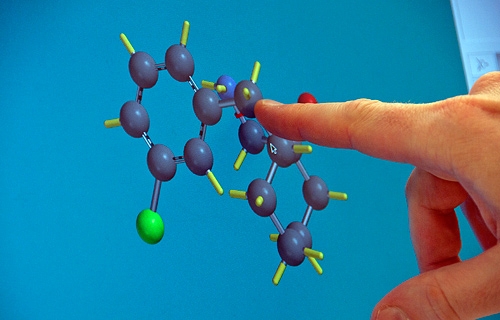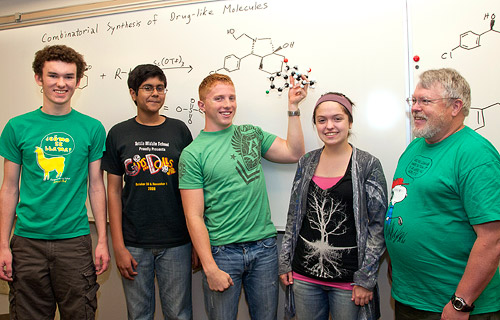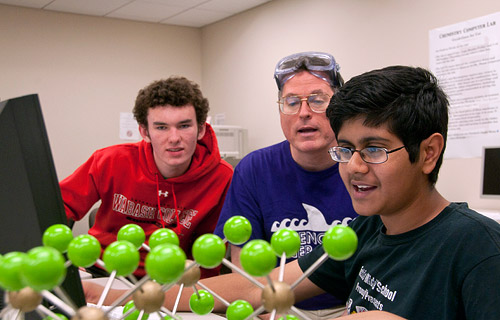Bridge 2 Science
June 21, 2011

More than 20 area high school students along with several teachers recently participated in Bridge 2 Science (B2S), an outreach program for local high school students and teachers. They spent a week on campus engaged in mini research projects with DePauw professors and students.
Two grants contribute to the program – Lilly Endowment, Inc. grant and National Science Foundation S-STEM grant. Both seek to recruit and retain more high school students in science fields by highlighting the science research process, exposing teachers to current research topics and methods, and building lasting collaborative relationships between the University and local high schools.
Eight of the high school students who participated are Julian Scholars – incoming first-generation college students from counties surrounding Greencastle. The scholarship program is a four-year grant supported by the National Science Foundation. NSF awarded $552,000 to DePauw for support of the Percy Lavon Julian Scholarship program. So far, there have been 24 Julian Scholars who participated in the B2S program during the summer before attending DePauw. Read more about Julian Scholars by clicking here.

Gloria C. Townsend, professor of computer science and coordinator of the Women in Science Program, is B2S program coordinator. She also coordinates the Julian Scholars program. Townsend attended a small high school in rural Indiana. “I understand how opportunities to leave an isolated, rural area in central Indiana to attend University events contribute to the academic growth of high school students,” Townsend says.
“There are many DePauw students already on campus during the summer engaged in research projects as Science Research Fellows (SRF), National Science Foundation students, Research Experience for Undergraduates students in Computer Science, or recipients of in-house or external grants,” Townsend explains. “The students and professors in these research projects volunteered their time to collaborate with the high school students and teachers.
“Since the Julian Scholars who participate are typically first-generation students, living on campus has extra benefits,” Townsend says. “The students have the chance to bond with each other and become familiar with campus, upperclass students and professors before returning to campus for fall classes.”
The students selected one of five research projects that focused on chemistry, biology or physics. Jeffrey “Jeff” A. Hansen, 1986 DePauw graduate and associate professor of chemistry and biochemistry, taught Diversity Oriented Synthesis.

“The B2S opportunity gave students in my group a quick introduction to what organic synthesis is about, which is building up carbon-based molecules – the molecules that make up all living things,” Hansen explains.
“Making organic molecules is very common, particularly in the pharmaceutical industry,” Hansen says. “Chemists make most of the drugs we take. The research that I do is not attempting to make specific drug molecules, but trying to develop reactions that organic chemists could use to build up molecules.
“The chemicals are building blocks, and the reactions are tools to build things with. So, we’re trying to develop a new tool to add to that toolbox to help chemists be able to build up molecules.”
Hansen’s DePauw students have been working on an epoxidation reaction for several years, and they have some of the product of it. “One of the newer things we’re trying to achieve is to see what we can make out of that molecule that we’ve been working on, which is the next step in the research. A couple of students have developed a reaction, which is what we worked on with the high school students last week.
“When the reaction was finished, we were able to fish out our product from the mixture. The process showed some of the techniques that we use, and we were able to do an analysis of it,” Hansen says.
All students shared their findings in a poster session. “Poster sessions are one of the ways scientists regularly communicate their findings at conferences, and it fosters a lot of interaction,” Hansen says. “We often get ideas from people who attend, which is very helpful. The session was a good opportunity for the high school students to talk about what they did, explain their understanding of what the research means and share what the experience was like for them. Hopefully, the weeklong experience encouraged them to continue to pursue science,” Hansen says.
Lisa A. Poole ’12, a biochemistry major, participated in B2S as a student counselor and science mentor for the Julian Scholars. Poole believes that the B2S program is a great opportunity for high school students to get an authentic idea of what it’s like to study science at the college level. “As a rising senior, I’ve only done a poster once,” she explains. “So, I think it’s great that the high school students get to experience this so much earlier.
“I overheard some of the students comment on how difficult the week was,” Poole says. “I think it’s great that they get the hang of that now and accept it, because sciences at DePauw are rigorous. Even though the program is just one week, it’s really nice for them to get a real research experience.”
DePauw’s summer research community – approximately 100 students – was invited to the poster session event, and all are invited to return in November 2011 to participate in the annual DePauw University Poster Session, which is also open to the public.